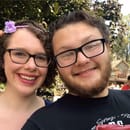When I was 5 years old, I viewed the world through a selfish filter. I wasn’t mean or uncaring, but everything I interacted with, I understood only as it affected me. Other people were just things I hid from behind my mom’s legs, pre-school was just the place with the sets of Rescue Heroes action figures I didn’t own, and work was just something I’d do one day when I was a rockstar/firefighter/the President. The world outside my little sphere was simplistic and routine until my brother was diagnosed.
I knew Mikey was a little different, but I couldn’t begin to understand all the implications. At the end of the 90’s, “autism” was barely understood by doctors, let alone by two twenty-somethings trying to explain to their oldest son why his sibling couldn’t talk or look him in the eye at age 4. I didn’t see most of the screaming tantrums or nights my mom spent sobbing into my dad’s shoulder. However, I knew he got more attention, more visitors, and a much longer goodnight than I did. It didn’t take long for jealousy to take root.
As I grew older, my jealousy morphed into a deep, gut-wrenching shame. Instead, I went fully in the opposite direction; I became an overbearing guardian. I thought it was my job as an older brother to shield him from a cold, uncaring world that would belittle him for his disability. I’d throw myself between him and strangers on the street, blurting out “Sorry he doesn’t know any better.” Every time he’d seek to engage someone on the street, I’d shuffle him back towards my mother, confident that I’d prevented some kind of catastrophe.
Years later, when we were both just starting high school, Mom was listening to Mikey talk while I was tuning out the world with my obnoxiously loud emo rock. One snippet I managed to catch from the other room was my mom, almost crying, saying “I’m so proud of how far you’ve come.” She must have said that to him a hundred times a day, but this time, for whatever reason, stuck in my head. For weeks afterwards, I listened to every word he said, and new shame crept into my mind: shame toward myself. I never once considered how much of a miracle it was that he was able to speak at all or that he wanted to talk to people, because I didn’t really know anything about him. I wasn’t trying to protect him—I was trying to hide him.
Now, at 23 years old, I’ve seen Mikey graduate high school, develop his life skills to an amazing level, and make more friends than I could hope to in a lifetime. He knows the ins and outs of every muscle car made in the world and will tell you facts about dinosaurs most people get degrees to know. Moreover, he’s taught me how to listen and understand people on a deeper level. Shame has been replaced with pride at the fact I could be related to such an incredible person who doesn’t see himself as any less than perfect for what he is.


